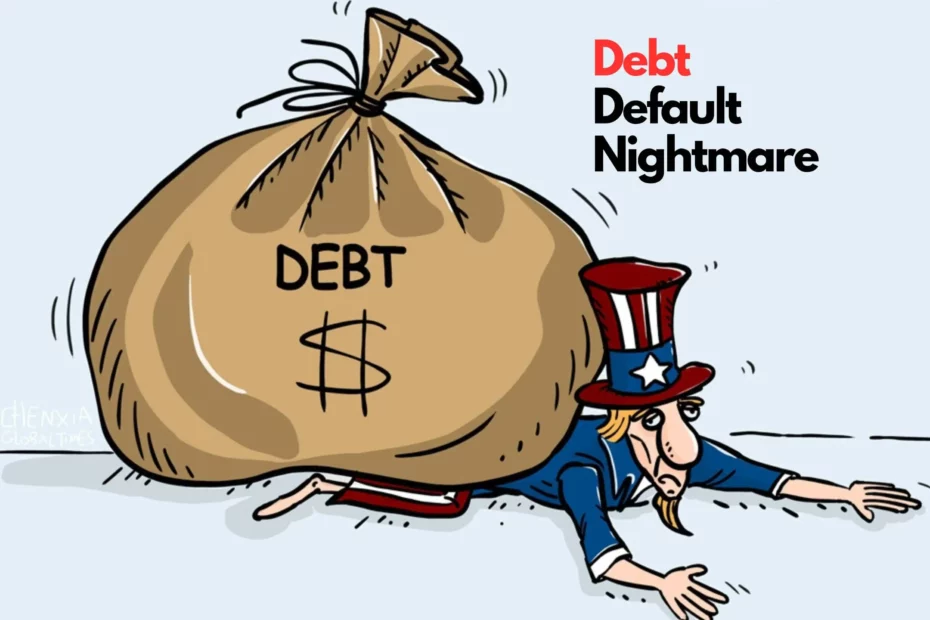The looming debt crisis has captured the attention of Americans, although many may not fully grasp the gravity of the situation. Recent polls indicate that a significant majority of the public considers the debt limit issue a crisis or major problem, with a substantial portion fearing catastrophic consequences if the debt ceiling is not raised. In this article, we will delve into the potential impact of a debt default on the global financial system, examine the differing opinions on who is to blame, and explore possible solutions to prevent such a dire outcome.
The Risk of a Debt Default
The possibility of a debt default poses severe risks, not only for the United States but for the entire global financial system. If the United States fails to meet its financial obligations, it could trigger a series of catastrophic events. The repercussions could be far-reaching, affecting both the lives of everyday Americans and the stability of the global economy.
Immediate Consequences for Americans
A debt default would have a direct impact on the lives of American citizens. Federal workers may face furloughs, and senior citizens could experience delays in receiving their Social Security checks. Furthermore, mortgage rates are projected to soar, putting homeowners at risk of financial instability.

Implications for the Global Financial System
The potential consequences of a debt default extend well beyond the borders of the United States. An analysis by Moody suggests that over 8 million jobs could be lost, and the economy could contract significantly, similar to the 2008 Great Recession. The stock market would likely plummet as investors anticipate a broader economic downturn and withdraw their funds to secure short-term liquidity. Additionally, banks, already cautious about extending new loans, could further tighten lending standards.
The Role of the United States as the Global Financial Stabilizer
The United States has long been regarded as the provider of stability in the global financial system. However, a debt default would jeopardize this standing, creating opportunities for other countries to challenge the U.S. dollar’s position as the world’s reserve currency. Countries such as China, Russia, South Africa, India, and Brazil would eagerly seize the chance to undermine the dollar’s dominance. This shift could result in an immediate and substantial cost to the United States. In fact, during the threat of default in 2011, the credit rating of the United States was downgraded, highlighting the gravity of such a situation.

Debt Ceiling Disagreements and Political Dynamics
There is a palpable sense of disagreement over who bears the blame for the debt ceiling crisis. According to a Washington Post/ABC survey, only 28% of respondents believe President Biden should agree to cut spending, while 59% argue that the debt ceiling and spending cuts should be treated as separate issues. Conversely, an older Harvard/Harris survey found that Republicans should agree to raise the limit if there are corresponding spending cuts.
As the crisis unfolds, the public perceives a possible debt limit default as a significant crisis, increasingly holding Republicans accountable. To avoid being viewed as the villains, the GOP could demonstrate responsibility by voting for a temporary debt limit increase. By waiting for the new budget to be negotiated in a few months, Republicans would gain leverage, as the budget and the limit could be considered a single issue. Paradoxically, this would allow the minority party to overturn programs passed by the majority that cannot be continued. It presents an opportunity for the GOP to portray themselves as responsible rather than reckless.
The Challenge Within the GOP
Internal divisions within the GOP further complicate the debt ceiling issue. While House members are inclined to stand firm, Senate Republicans seek a compromise. Paradoxically, it may fall upon the Democrats to save House Speaker Kevin McCarthy. If McCarthy strikes a deal that is rejected by House conservatives, Democrats could rally to his aid and push the agreement through the House to the Senate, where Democrats hold the majority and GOP Senators are more fiscally astute.

The Consequences of Risking a Debt Default
Regardless of who is ultimately blamed, the consequences of risking a debt default are dire. The potential fallout includes a significant decline in stock prices, the erasure of trillions of dollars in household wealth, and the devastation of retirement accounts. Moreover, the stability of the global financial system would be severely undermined, with far-reaching implications for the world economy.
Expert Words
A debt default in the United States could lead to disastrous consequences, impacting the lives of Americans and straining the global financial system. It is crucial for political leaders to prioritize the people’s interests, set aside differences, and work together to avoid such a scenario. By preventing a debt default, the United States can maintain its role as a stabilizing force in the global economy and protect its own financial well-being as well as that of the world. A resolution is urgently needed to prevent a potential catastrophe and maintain a functioning government that transcends partisan divides.
